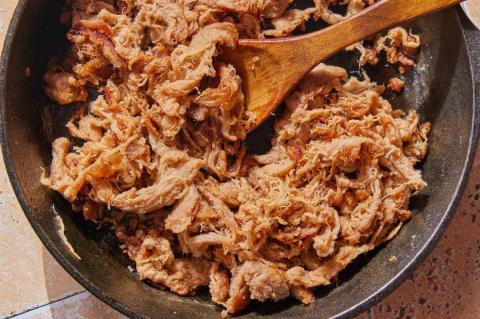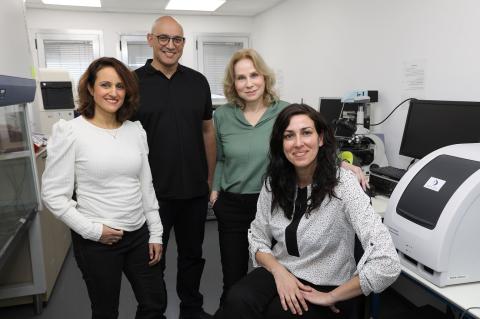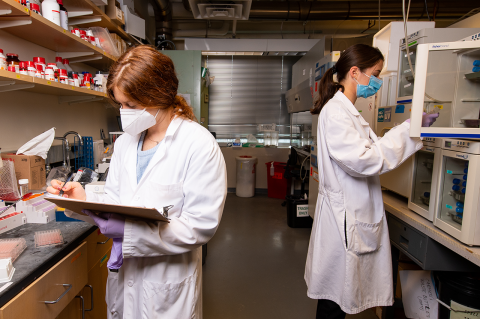
Funding

Sponsored Research Agreements
TUCCA engages with industry, usually via Sponsored Research Agreements, to conduct specific studies of relevance to the field and to the industrial sponsor. These agreements are coordinated via our Technology Transfer Office. If you are interested in working with our researchers, please reach out to our Director (david.kaplan@tufts.edu) to initiate a discussion about TUCCA can help address your specific needs.


Wanda Fish teams up with Tufts University on cultivated seafood research
Nonprofit Funding
Graduate fellowships were provided to several of our early PhD students via New Harvest. Grants have been provided to some of our PhD students via the Good Food Institute (GFI).
Donations and Gifts
We are grateful to private donors who have helped us establish this initiative at Tufts University. A special thank you to our early donors who believed in TUCCA's mission before cellular agriculture become eligible for any kind of grants. Donations continue to allow us to build programmatic efforts, create open-source resources, and grow as a center. If you are interested in supporting our work by sponsoring a student, a specific project, or via an unrestricted donation, please reach out to David (david.kaplan@tufts.edu) and Meera (meera.zassenhaus@tufts.edu).
Grants
Baylor College of Medicine's Translational Research Institute for Space Health (TRISH) - Space Health Ingress Program (SHIP) — [ Grant: NASA NNX16AO69A 2024-2026]
Team: Denneal Jamison-McClung, UC Davis; Karen McDonald, UC Davis; Somen Nandi, UC Davis; David Kaplan, Tufts; Matt McNulty, Tufts
Food security and optimized nutrition are essential requirements for crew health during deep space missions. Whilet here have been dramatic advancements and investments in disruptive food technologies on Earth, driven by sustainability goals and animal welfare considerations, applications to space food systems have been lacking. The goal of this project is to reinvigorate the food-related space health research community by broadly mobilizing FutureFoods academic and industry researchers who are unfamiliar with the challenges, constraints, and opportunities of space exploration, as new space health investigators. This will be accomplished through five integrated FutureFoods for Space program activities: 1) conducting a series of Educational Webinars, 2) establishing a Mentorship Network, 3) hosting a Research and Innovation Training Workshop, 4) implementing competitive seed grant awards- New Investigator Pilot Research Projects, and 5) hosting a Research and Innovation Symposium. This suite ofproposed activities will be designed to assist investigators in transitioning their current future foods research tospace health applications, with a goal of having at least 20 new space health proposals submitted within the two-year period.
Tufts-USDA National Needs Doctoral Fellowship Program in Cellular Agriculture, Nutrition and Society (CANS) — [Grant: 2024-38420-41539 December 2023 - December 2028]
Team: Sean Cash, Tufts; Nicole Blackstone, Tufts; David Kaplan, Tufts; Joel Mason, Tufts; Timothy Griffin, Tufts; Parke Wilde, Tufts; Fang Fang Zhang, Tufts
Cellular agriculture is attracting increased attention as an environmentally sustainable method of growing animal protein for human consumption. However, the field of cellular agriculture currently lacks highly qualified personnel. The proposed program will train three Ph.D. Fellows in the Targeted Expertise Shortage Area (TESA) of Food Science, Human Nutrition, and Human Sciences. The goals of the program are to: build expertise in cellular agriculture, balance the science and technology aspects of this field with critical social and environmental aspects, train policy and regulatory experts, catalyze interdisciplinary communication and collaboration, strengthen students' leadership and professional development, and support breakthrough innovations. Our program is aligned with several Strategic Goals from the USDA Strategic Plan FY2022-2026 and it addresses Disciplines G, N, B, C, L, E, M, F, I and S. This program will implement an integrative and holistic training that emphasizes social skills critical for effective team work, provides meaningful mentoring, develops intellectual capital, and prepares students to become leaders in fields related to cellular agriculture, food and nutrition sciences, and alternative proteins. Due to both the nascency of this emerging industry and the established reputation of Tufts to train leaders in cellular agriculture, we are confident that Fellows will be able to pursue high-level employment positions, including c-suite roles, R&D leaders and founders of their own companies. The large pool of potential Ph.D. students combined with the mission of our cellular agriculture program allows us to attract and retain underrepresented minority applicants.
USDA National Institute for Cellular Agriculture — [Grant: 2021-69012-35978, September 2021-August 2026]
Title: Integrated Approaches to Enhance Sustainability, Resiliency, and Robustness in United States Agri-Food Systems
Team: David Kaplan, Tufts; Nicole Tichenor Blackstone, Tufts; Sean Cash, Tufts; Reza Ovissipour, Virginia Tech; Nitin Nitin, UC Davis; Markus Buehler, MIT; Michael Tlusty, U. Mass. Boston; Yixiang Xu, Virginia State
Summary - This proposed project aims to innovate the food supply chain from cell to fork and enhance food sustainability, nutrition, and food security by developing a cell-based meat platform based on the integration of physical, biological, and social sciences. Cultivated-meat production is emerging as an alternative source of sustainable protein to help address nutrition and food safety for consumer choices. Cultivated-meat faces many obstacles on an industrial scale: (a) questions related to consumer acceptance, perceptions, and expectations; (b) technical sound life cycle and techno-economic analyses; (c) limited access to low-cost media and suitable cell lines impacting scalability; (b) lack of available sustainable biomaterials to achieve nutritious, safe, and organoleptically accurate cultivated-meat; (c) lack of systematic approaches for training the next generation of professionals. Our central hypothesis is that a sustainable, cost-effective, and scalable cultivated-meat platform will increase food availability options for consumers while decreasing environmental impact.
ARPA-E grant on cellular agriculture sustainability – via subcontract from Mori, Inc. [February 2021-December 2022]
Title: Reducing Greenhouse Gas Emissions and Energy Demands in the Meat Production Industry via Scaling Advanced 3D Culture Bioreactors
Summary - Food production, in particular animal-derived meat products, are a major source of greenhouse gases (GHG), compounded by the remarkable inefficiency in biomass conversion (grain to dense muscle tissue in meat), along with growing challenges with food safety, quality, and nutrition. To address this growing problem, we propose to exploit the emerging field of cellular agriculture (tissue engineering of muscle and fat for food) as a route to significantly reduce GHG and energy use and to address the associated challenges listed above and associated with current livestock production methods for meat output. The scaling process is the major focus of this proposal, to implement two novel bioreactor designs, to assess scaling and outcomes (e.g., biomass per unit volume, cost of production, GHG/energy usage) for in vitro meat production. This study will accomplish two major outcomes with new enabling technology: (a) demonstration of feasibility for scaling in vitro meat production – from the bench-scale to the macro-scale, and (b) provide data upon which suitable mass and energy balances can be derived to address accurate predictions of energy, GHG, and related savings.
Merck Innovation Award for bioreactor design — [March 2020-March 2024]
Title: Advanced Manufacturing of Cultured Meat via Textile-Based Bioreactors
Summary - The aim of the project is to develop a system that will enable the large-scale construction of tissue engineered muscle and fat that will be safe for human consumption. The team plans to design and construct a bioreactor capable of producing the optimized cultured meat tissue fibers in a scalable manner.
NASA - insect cell cultivation for foods of the future — [November 2021 to December 2022]
Title: Deep Space Entomoculture
Summary - To develop technology to use cultured insect cells as novel food products during long-term space missions.
